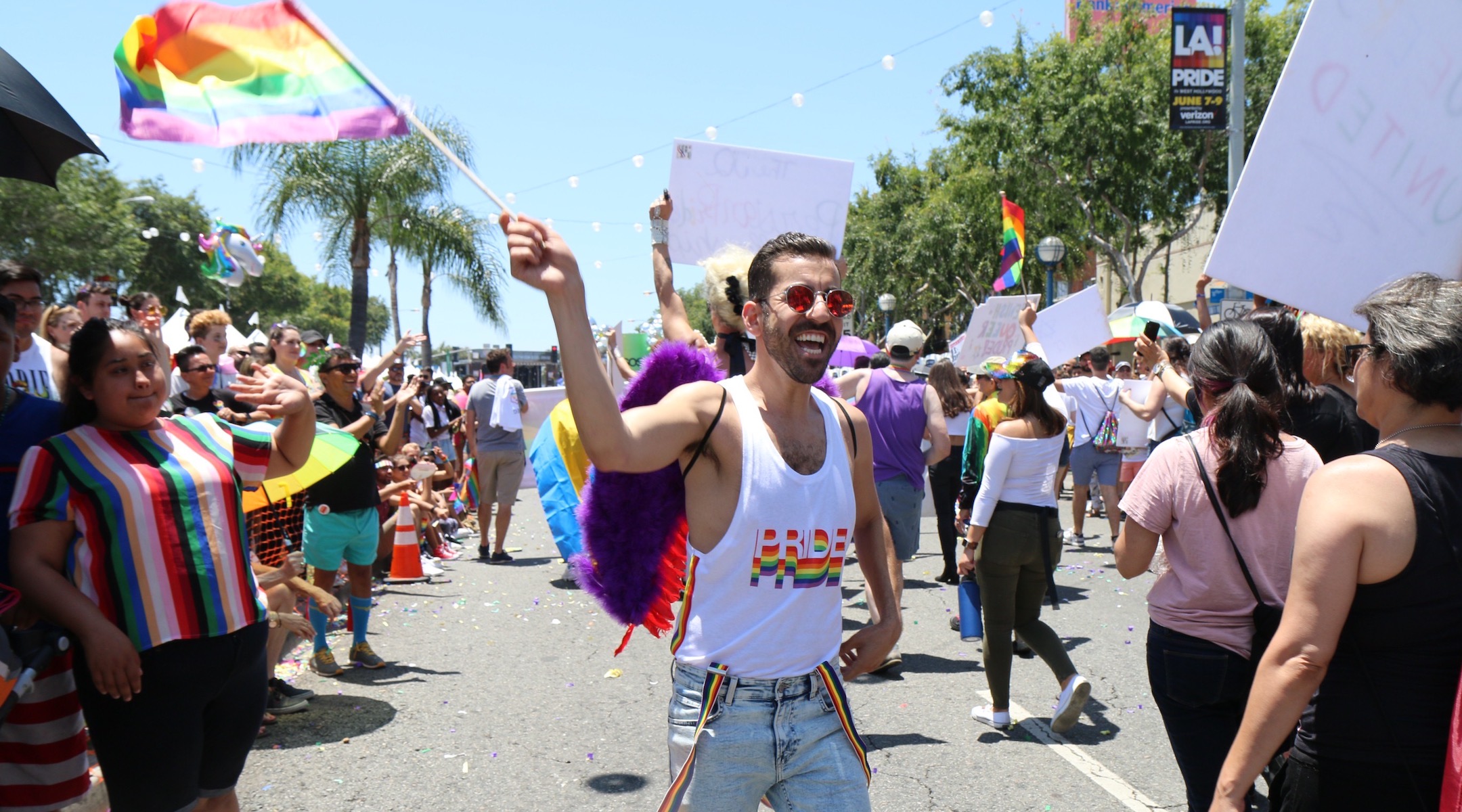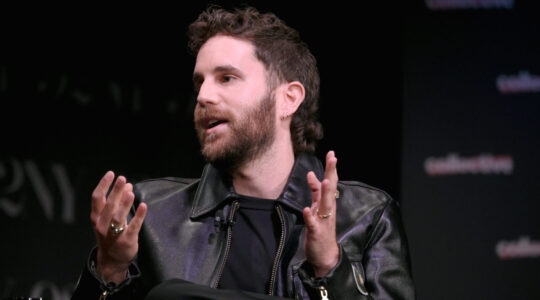LOS ANGELES (JTA) — Growing up, Arya Marvazy knew only of one person who came out as queer in his tight-knit Persian Jewish community. That person was ostracized by family members. He frequently heard homophobic jokes and comments, including by peers, relatives at Shabbat dinner and — one time that seared into his memory — the rabbi of his synagogue.
So when Marvazy realized he was gay in sixth grade he felt “completely and utterly alone.”
“I really did believe, if I’m being honest, that I could not come out and live a functional life amongst friends and family and community as a Persian Jewish person,” he said.
But things looked different when Marvazy shared his coming-out story in March to some 100 people at the West Hollywood City Council chambers. The attendees had come together to celebrate the fifth annual Persian Pride Month, an initiative that Marvazy leads for the Jewish LGBTQ group JQ International.
Ordinarily, Persian Pride Month serves as the community’s precursor to the citywide Pride celebrations here, but the city’s planned events, which had been scheduled for this past weekend, were canceled because of the coronavirus pandemic.
At the event, Marvazy’s mother was one of several parents who shared their road to accepting their children. Marvazy, 33, moderated a panel consisting of an eclectic group of community members — a man decked out in drag spoke of his experience coming out as gay and experimenting with gender boundaries, while a middle-aged woman talked about how she handled her child coming out as transgender.
The audience applauded loudly as people shared coming-out stories, while everyone sat in silence as a therapist read a letter from a mother whose gay son committed suicide.
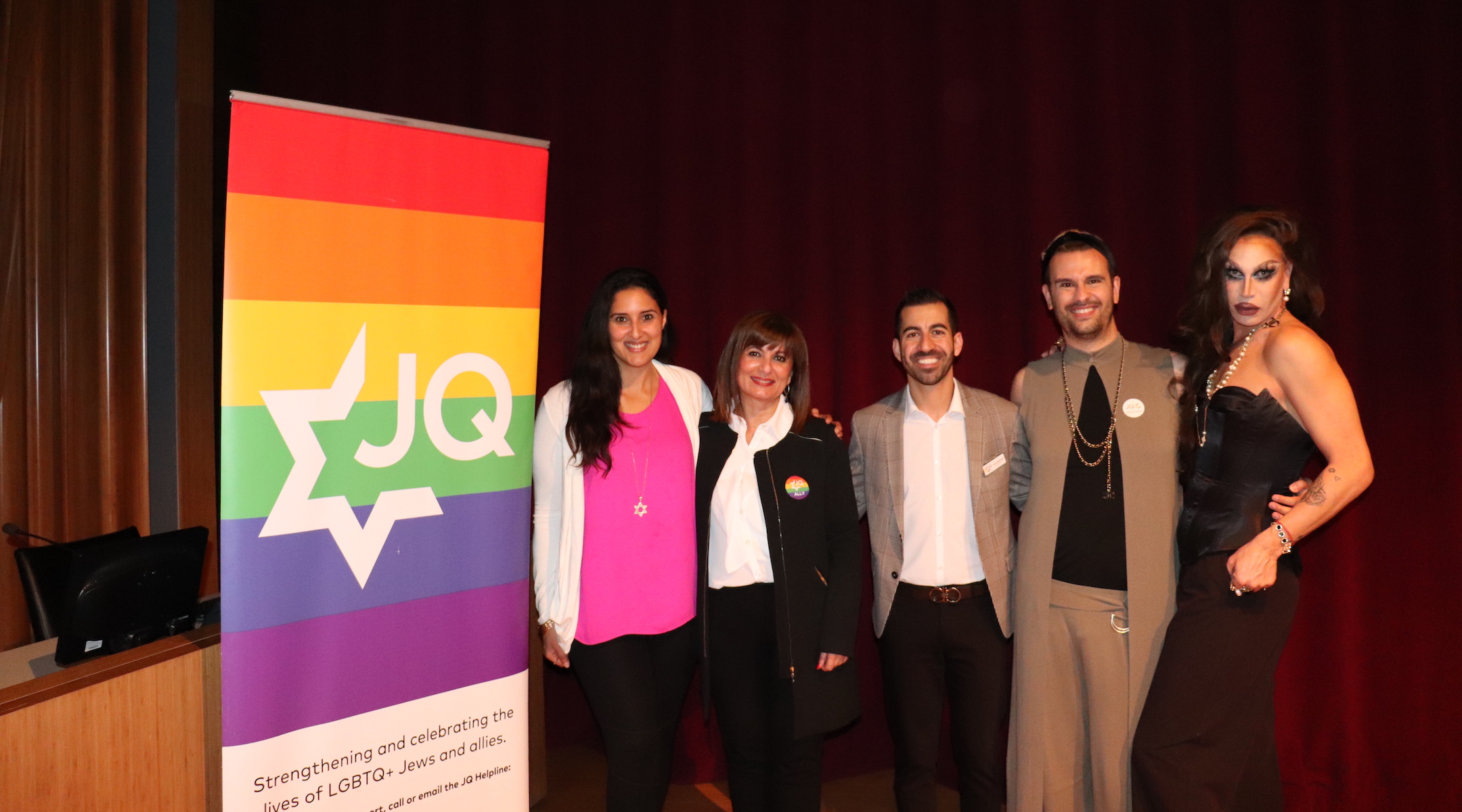
From left to right, Amanda Maddahi, Mahnaz Farzinpour, Arya Marvazy, Amir Yassai and Matthew Nouriel dressed up as drag persona “The Empress” after speaking at a Persian Pride event at the West Hollywood City Council chambers, March 5, 2020. (Josefin Dolsten)
The event is emblematic of a change that has been taking place in the last five years in Los Angeles’s tight-knit, socially conservative Persian Jewish community, community leaders say.
“There are issues that have been taboo. They’re changing rapidly. The community is changing. People in our community like in the larger society are coming out and in the beginning it’s a shock but then you realize it’s the same person, so what if their sexual preference is different?” said Sam Kermanian, 64, a longtime community leader and senior adviser to the Iranian-American Jewish Federation.
Mastaneh Moghadam, an Iranian-American social worker who has spent 20 years counseling hundreds of LGTBTQ Iranians in the city was one of the panelists at the event. When she started a support group for Iranian parents of LGBTQ children in 2015, she was struggling to get more than one person to come. Today, the group has more than 50 members.
“I think the community has become just more willing to open their minds and open their hearts and really listen and hear the stories, and I think that’s what’s made the biggest change,” Moghadam, 46, told the Jewish Telegraphic Agency.
Persian Jews settled in Los Angeles — jokingly nicknamed Tehrangeles — in the 1970s, fleeing persecution following the Islamic Revolution. Today there are about 50,000 Persian Jews living there, making it the largest community outside Israel. The community has flourished and the city is now home to dozens of synagogues, grocery stores and other organizations catering specifically to their needs.
The tight-knit nature of the Persian Jewish community in Los Angeles has allowed it to thrive while maintaining its unique culture, but it also poses unique challenges to LGBTQ people, outside of those found in larger American society.
“I think for many of us as Iranian LGBTQ people, we naturally struggle with what it means to be part of a reputation-based society and a very tight-knit community and dealing with an identity that is historically looked at as shameful,” Marvazy said.
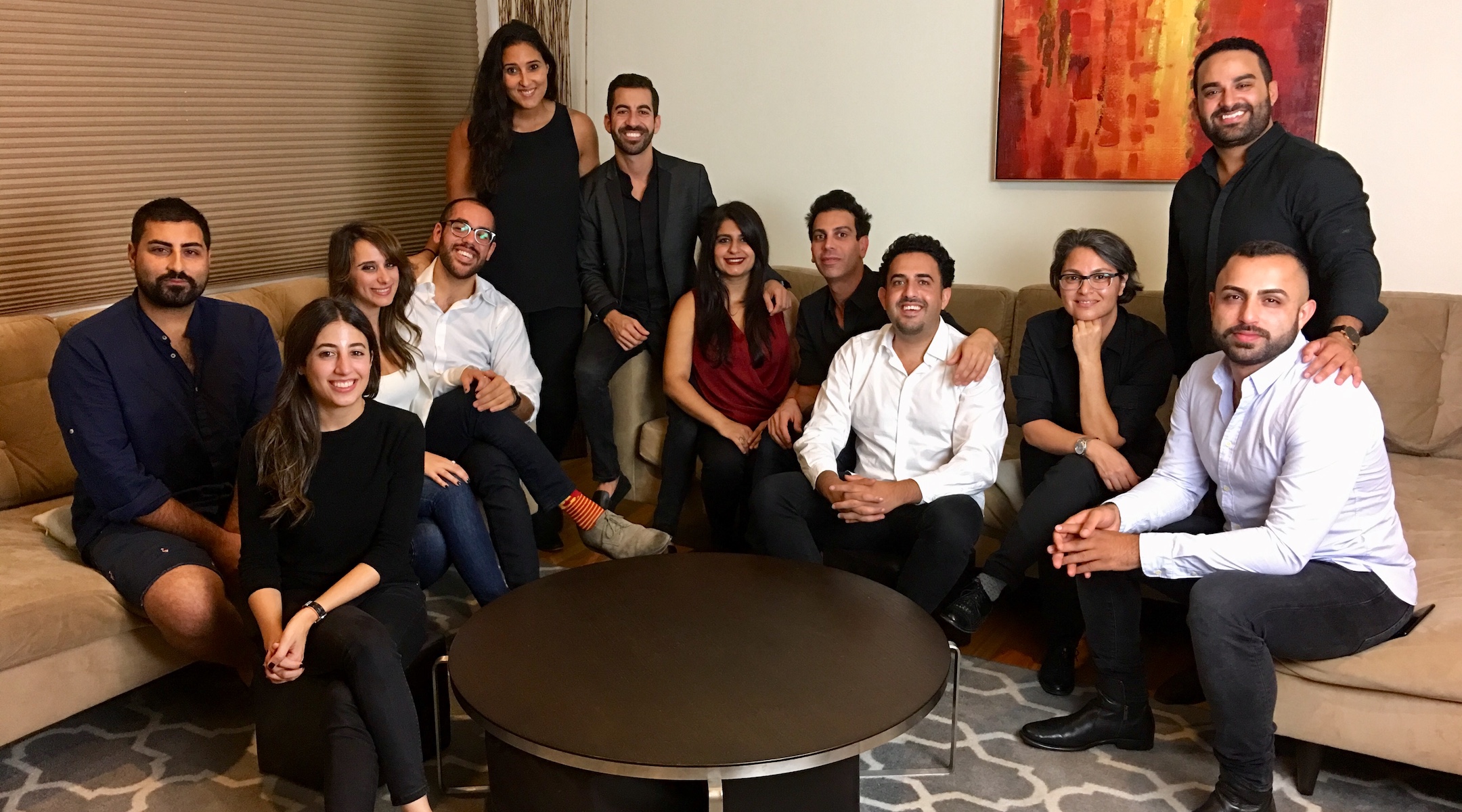
Maddahi and Marvazy in the back together with graduates of JQ International’s first Persian Pride fellowship cohort in 2018. (Mariya Stangl)
In the fall of 2015, Marvazy was able to put a face to that stigmatized identity when he publicly came out as gay in a Facebook video. His announcement made waves in the community and was viewed more than 35,000 times. In fact, Marvazy still gets up to a handful of messages every week from people who have seen the video and are seeking advice in coming out.
A few months after his public coming-out, he started working part time for JQ International and later would join the organization full time. The group puts on cultural, social and religious events for young LGBTQ Jews and welcomes queer youth of other faiths.
As people sheltered at home this spring because of the pandemic, JQ International’s helpline saw a record number of calls — something Marvazy attributed to closeted members of the community losing their outlets beyond their homes.
“We’re seeing raised levels of anxiety and depression, and emotional and mental hardship,” he said.
The group had to cancel some of its Persian Pride programming, originally scheduled to extend throughout March, but has been hosting virtual events to provide support and a sense of community.
Moghadam, the therapist who counsels LGBTQ people, said the value that the community places on collectivism and conformity can make it hard for people to come out.
“Anything that makes you unique and different from the general public is looked at as taboo, and so sexual orientation being different than straight is definitely something that’s looked at as taboo and not normal,” she said. “And then in a lot of cases because of that it’s so heavily shamed and looked down upon, and all of that makes a person who is LGBTQ further marginalized.”
When children do come out, it is common for parents to push them to receive conversion therapy, Moghadam said. The debunked practice uses therapy and sometimes hormones in an attempt to change participants’ sexuality. But that’s changing, too.
Prior to five years ago, about 70% of Moghadam’s patients had gone to conversion therapy. Now that number is about 40-50%, although Moghadam said part of the shift has to do with children being more educated on the practice and refusing to go.
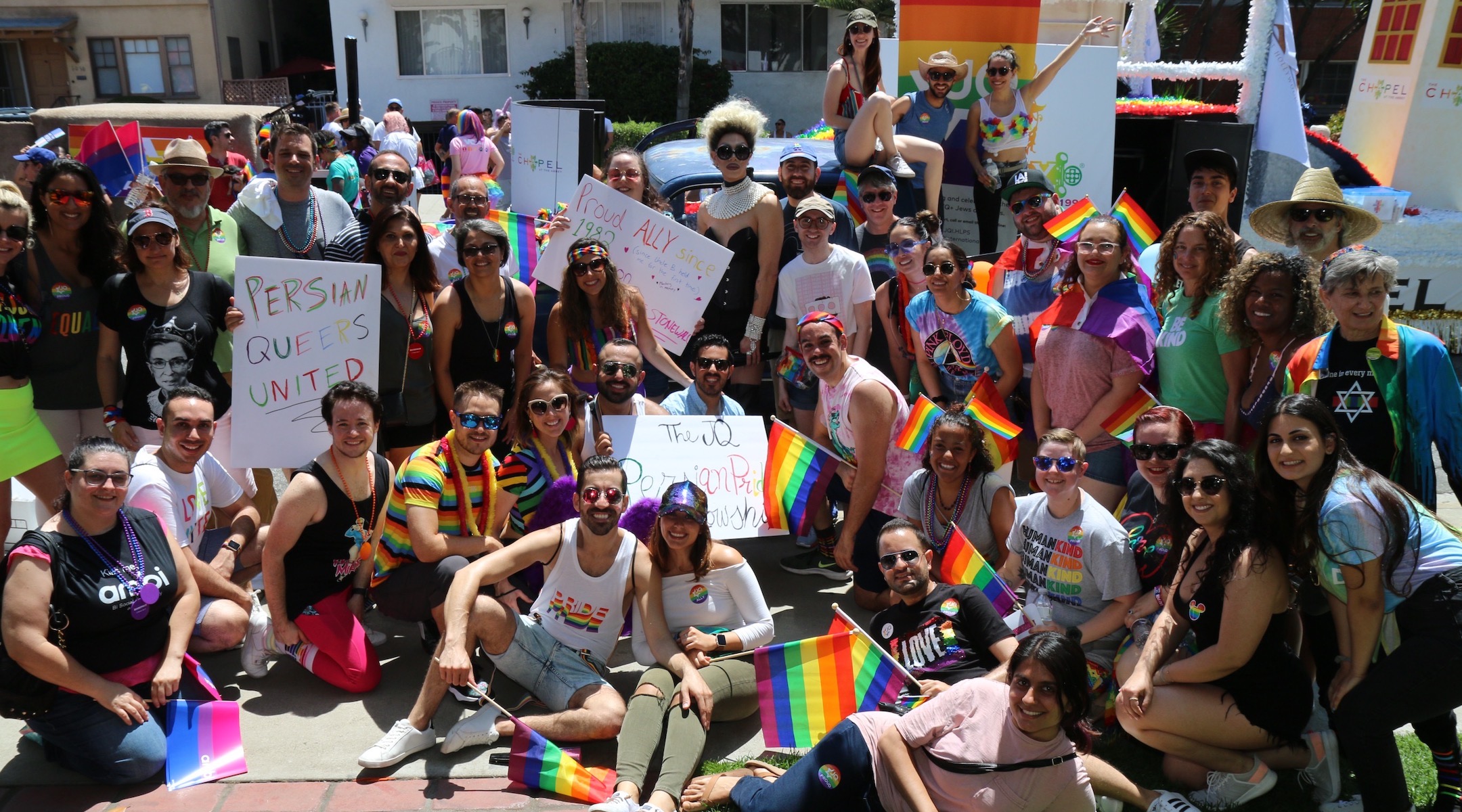
A delegation of Persian Jews and their friends marched at the Los Angeles Pride Parade in 2019. (Anna Falzetta)
Change is also happening around other topics. In 2014, Nicole Nowparvar founded Chaya together with two friends because she wanted to encourage discussions about issues the community had traditionally shied away from.
“There was an element that I felt was missing in our community, which was the openness to diversity and a lack of meaningful conversations,” said Nowparvar, 30. “I think there was an element of shame and fear in our community that didn’t allow people to express who they truly were.”
The organization has grown from hosting monthly to weekly events where community members come together to discuss taboo topics such as the LGBTQ community, sex and mental health.
Later this year, Chaya aims to host the second-ever Taboo Summit, an event that brings together more than 100 Persian Jews to discuss topics that are traditionally off-limits. (The event was originally supposed to take place in March but was postponed due to the coronavirus.)
The summit was created by graduates of a fellowship offered by 30 Years After, an organization that encourages civic participation among Persian Jews. The first one focused on LGBTQ issues, body image and dating. This year’s summit is dedicated to sex.
“I think people are ready for this and they’re ready to have these conversations,” Nowparvar said.
Sam Yebri, 30 Years After’s president and co-founder, said an increased openness to breaking down taboos is being driven by young community members.
“It’s a generational shift,” said Yebri, 38. “It has taken time, but those conversations are happening. There’s a new openness to break those taboos.”
Still, there’s a long way to go. Moghadam, the therapist who specializes in LGBTQ issues, says that nearly every one of her patients has contemplated suicide at one point.
And at a recent JQ International retreat for young Iranian Americans, only about half of the 20 participants were comfortable enough to pose for a group photo.
“The people in our spaces are relatively happy and their lives have improved by anywhere from tenfold to hundredfold to even a thousandfold,” said Amanda Maddahi, a 33-year-old LGBTQ activist who previously served as JQ International’s assistant director.
“The success stories are there and change has been made and the infrastructure set up, [but] it is by no means flawless. Gossip is still rampant. There are still people that are fatally in the closet.”
JTA has documented Jewish history in real-time for over a century. Keep our journalism strong by joining us in supporting independent, award-winning reporting.
